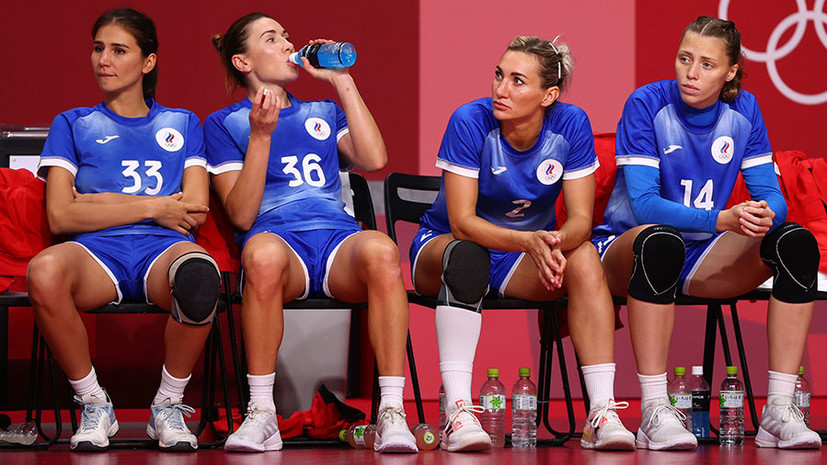Russian handball players were the last athletes to compete under the flag of the Russian Olympic Committee at the Tokyo Games. Their other compatriots had already finished their performances and were waiting for the closing ceremony and flights to their homeland, while Alexei Alekseev's wards still had to fight for gold medals with the French national team.
No matter how much we wanted to avoid parallels with the final in Rio de Janeiro, where the same teams were arguing for victory, there were still too many reminders of that tournament five years ago. Firstly, 15 girls from Brazil, eight from Russia and seven from France, were supposed to enter the site. Secondly, the teams chose the same colors of the kits in which they had the previous fight for the Olympic gold. Finally, the final was supposed to be served by the judges from Slovenia, well-known to the Russian women, who had completed the match with Norway, after which it became possible to meet with the “tricolors” in Rio.
There was one big difference between the two matches. If then the girls openly skimped on goals and scored only 17 goals in the entire first half, then the new meeting was much more productive. Already in the first minute, a seven-meter was assigned to the gates of Russia, and the permanent penalty taker of the French national team Alison Pino realized it, breaking through the heroine of the semifinals Anna Sedoykina. Soon the second blow followed, which was already reflected by Victoria Kalinina. Pino tried to improve on finishing, but the goal was canceled due to a spade. This mistake allowed the Russians to take possession of a slight advantage in the score - Polina Vedekhina scored two goals in a row, and then Anna Vyakhireva effectively completed the counterattack.
But the Olympic champions did not lead for long. Soon, Polina Kuznetsova received a two-minute removal, and a penalty kick against the Russian national team began to be assigned with enviable regularity. By the beginning of the 13th minute, the French women scored three more goals from the seven-meter line, and their author was not only Pino, but also Gras Zaadi, the playmaker of Rostov-Don. Through the efforts of Daria Dmitrieva, who earned a penalty and completed two attacks, they managed to regain the lead, but again only for a few seconds. Even the ingenious goal of Vyakhireva, who jumped out like a devil from a snuffbox and threw Amandine Leino over her ear, could not confuse her rivals.
The French women defended tenaciously, reliably and rigidly, not allowing a positional attack to unfold. They had to seek happiness either with long-range throws or in quick attacks. But they did not always give a result. Once Anna Sen managed to take possession of the ball in her own half and threw it into an empty net, but Leino managed to jump out to replace and reflect the throw, without having time to slow down in front of the billboard. The goalkeeper broke through the obstacle, avoiding injury, but next time she did not have time to repeat her feat. Yulia Managarova completed the reshuffle with an accurate throw into the unattended target.
At the end of the first half, the “tricolors” created a backlog of three goals, finally cut off Vyakhireva's oxygen and continued to use the weak play of the Russians in the line, for which the referees were generous with seven-meter penalty kicks. It was especially offensive to miss another of them, assigned for a foul by Vedekhina - Pino decided to throw the ball, and Kalinina touched him, but he still glided into the net. Returning to the court after sending off, Vedekhina organized two goals “in the locker room” and set the final score in the first 30 minutes - 15:13 in favor of France.
After the break, the Russians managed to return to the game. Another goal by Vedekhina, a throw from the block of Owlina Bobrovnikova and a counterattack by Polina Gorshkova made it possible to equalize the position and indicate their trump cards. But as soon as it seemed that everything fell into place, the Russian girls completely lost sight. Over the next seven minutes, they attacked a lot, but to no avail. The French women flew almost everything that could only fly. Poletta Foppa increased the lead to six goals with just under 15 minutes left in the match.
As soon as Vedekhina interrupted this unsuccessful goalless streak, Melin Nokandi returned everything to square one in six seconds. A fair removal of Ocean Sercien-Yugolen allowed to perk up and reduce the gap to four goals. There were nine minutes left to eliminate the remaining handicap. It was during this time that it was necessary to resolve issues with implementation and diversify the game in attack.
But even the return of Vyakhireva to the site did not change the position of forces, the star of the Russian national team was guarded equally well by six and five of them, and everyone else, with the exception of Vedekhina, did not fly corny that evening. Goalkeeper Cleopatra Darleux became the heroine of the finals, whose percentage of reflected shots in the second half was stubbornly striving for 50%. The match ended with a score of 30:25 in favor of France, which became the third country in history to make a gold handball double at one Olympics - previously only the USSR in 1976 and Yugoslavia in 1984 managed to do this.
The silver of the women's handball team was the last, 71st medal of the Russians in Tokyo. In terms of their number, this Olympics became the most successful since 2004, but in terms of the overall standings - the worst since 1912. The Russian team took the fifth place in the final table, giving way to Great Britain on the final day. The results of the handball final could not influence this in any way.

